
Paul Douglas Westphal was an American basketball player, head coach, and commentator.
The National Basketball Association's Rookie of the Year Award is an annual National Basketball Association (NBA) award given to the top rookie(s) of the regular season. Initiated following the 1952–53 NBA season, it confers the Eddie Gottlieb Trophy, named after the former Philadelphia Warriors head coach. Since the 2022–23 NBA season, winners receive the Wilt Chamberlain Trophy, named after the former Rookie of the Year winner.
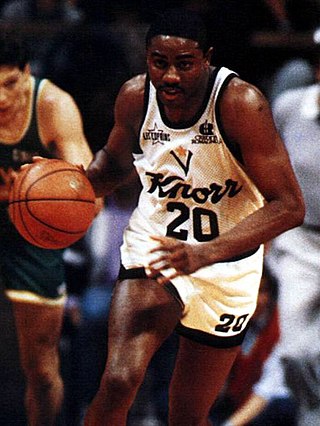
Micheal "Sugar" Ray Richardson is an American former professional basketball player and head coach. He played college basketball for the Montana Grizzlies. The No. 4 overall pick in the 1978 NBA draft, Richardson played in the National Basketball Association (NBA) for eight years with the New York Knicks, Golden State Warriors and New Jersey Nets. He was a four-time NBA All-Star, and led the league in steals in three seasons. He later became a head coach in the Continental Basketball Association (CBA) and National Basketball League of Canada.
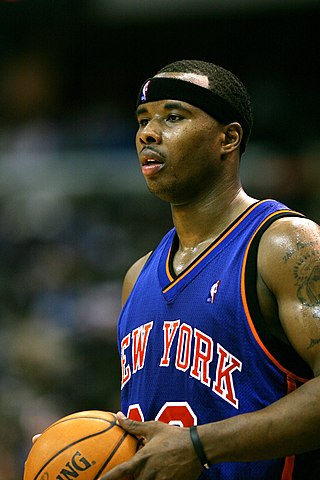
Quentin Lamar Richardson is an American former professional basketball player who was formerly the director of player development for the Detroit Pistons of the National Basketball Association (NBA). Nicknamed "Q-Rich", he played professionally for 13 seasons for the Los Angeles Clippers, Phoenix Suns, New York Knicks, Miami Heat, and Orlando Magic. He won the NBA Three-Point Contest in 2005.

Mark Anthony Aguirre is an American former basketball player in the National Basketball Association (NBA). Aguirre was chosen as the first overall pick of the 1981 NBA draft by the Dallas Mavericks after playing three years at DePaul University. Aguirre played in the NBA from 1981 until 1994 and won two championships with the Detroit Pistons after being traded to Detroit from Dallas in exchange for Adrian Dantley. Aguirre was a three-time All-Star for Dallas. Aguirre was inducted into the College Basketball Hall of Fame in 2016.

Adrian Delano Dantley is an American former professional basketball player and coach who played 15 seasons in the National Basketball Association (NBA). Dantley is a six-time NBA All-Star, a two-time All-NBA selection and a two-time NBA scoring champion. Dantley finished ninth on the all-time NBA scoring list at the time of his retirement and was inducted into the Naismith Memorial Basketball Hall of Fame in 2008. He served as an assistant coach for the Denver Nuggets of the NBA from 2003 to 2011. He played college basketball for the Notre Dame Fighting Irish.
Jerome "Pooh" Richardson Jr. is an American former basketball player who played 10 seasons in the National Basketball Association (NBA). He was selected in the first round of the 1989 NBA draft by the Minnesota Timberwolves, the first draft pick in franchise history. He would also play for the Indiana Pacers and Los Angeles Clippers during his 10-year NBA career from 1989 to 1999.
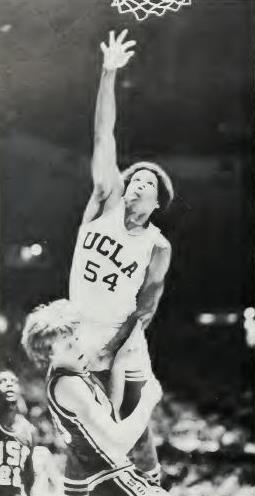
Marques Kevin Johnson is an American former professional basketball player and character actor who is a basketball analyst for the Milwaukee Bucks on Bally Sports Wisconsin. He played as a small forward in the National Basketball Association (NBA) from 1977 to 1989, where he was a five-time All-Star. He played the majority of his career with the Bucks.

John Edward Drew was an American professional basketball player. A small forward from Gardner–Webb University, he played eleven seasons in the National Basketball Association (NBA). Drew was a two-time NBA All-Star, and was the first player banned under the substance abuse policy instituted by league commissioner David Stern.
The 1986–87 NBA season was the 41st season of the National Basketball Association. The season ended with the Los Angeles Lakers winning their fourth championship of the decade, beating the Boston Celtics 4 games to 2 in the NBA Finals.
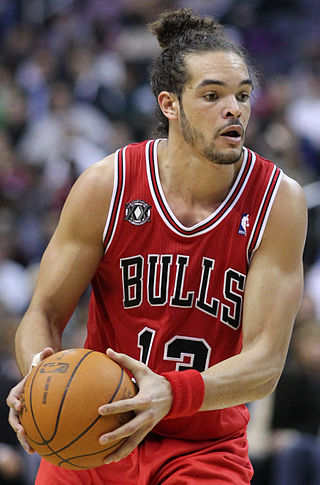
Joakim Simon Noah is a former professional basketball player. Born in New York, Noah was a member of the France national team and played college basketball for the Florida Gators, winning back-to-back NCAA championships in 2006 and 2007. The Chicago Bulls selected Noah with the ninth overall pick in the 2007 NBA draft. Noah is a two-time NBA All-Star and was named to the All-NBA First Team in 2014 when he also was named the NBA Defensive Player of the Year.

Greg Magado Minor is an American basketball coach and a former National Basketball Association player who spent five seasons with the Boston Celtics. Born in Sandersville, Georgia he played basketball for Washington County High School before enrolling at the University of Louisville to play for the Cardinals. He has been an assistant coach with the NBA Development League's Tulsa 66ers, Bakersfield Jam, and Idaho Stampede.
The 1988–89 NBA season was the Detroit Pistons' 41st season in the NBA and 32nd season in the Detroit metropolitan area. The Pistons moved from the Pontiac Silverdome to the brand-new Palace of Auburn Hills before the start of the season.
The Lt. Frank J. Haggerty Award is given to the top men's college basketball player from an NCAA Division I school in the New York metropolitan area. The players on this list who represent modern day non-Division I schools are five players from NYU and one player from CCNY. At the time of their awards, both NYU and CCNY were classified as Division I schools.
The 1995–96 NBA season was the Clippers' 26th season in the National Basketball Association, and their 2nd second in Anaheim. After finishing the previous season with the worst record, the Clippers received the second overall pick in the 1995 NBA draft, and selected Antonio McDyess from the University of Alabama, but soon traded him to the Denver Nuggets in exchange for Brian Williams, Rodney Rogers and top draft pick Brent Barry out of Oregon State University. With the continued development of Loy Vaught, the Clippers showed some improvement with a 7–5 start to the season, but then suffered a nine-game losing streak afterwards between November and December. The team would again lose nine straight games between January and February, and hold a 16–32 record at the All-Star break, as they played without Williams, Rogers, Pooh Richardson, Malik Sealy, and Stanley Roberts (ankle) for long stretches during the season due to injuries. The Clippers lost their final four games, and finished last place in the Pacific Division again with a 29–53 record.
The 2001–02 NBA season was the Clippers' 32nd season in the National Basketball Association and their 18th season in Los Angeles. The Clippers selected high school basketball star Tyson Chandler with the second overall pick in the 2001 NBA draft, but soon traded him to the Chicago Bulls in exchange for Elton Brand. With the acquisition of Brand and the continued improvements of second-year guard Quentin Richardson, Corey Maggette and Michael Olowokandi, the Clippers played their best basketball with a 15–11 start as of December 22. The team began to slip under .500, but still played competitive basketball through most of the first half holding a 25–26 record at the All-Star break, despite Lamar Odom only playing just 29 games due to a wrist injury, and second-year guard Keyon Dooling only playing just 14 games due to an ankle injury. However, after holding a 36–33 record in mid-March, the Clippers struggled and lost 10 of their final 13 games. They failed to make the playoffs finishing fifth in the Pacific Division with a 39–43 record, which was ninth place in the Western Conference.
The 1989–90 NBA season was the Mavericks' 10th season in the National Basketball Association. A year after missing the playoffs, the Mavericks received the eighth overall pick in the 1989 NBA draft, and selected Randy White out of Louisiana Tech, and later on fired head coach John MacLeod at the end of November, replacing with him Richie Adubato. However, things would not all go smoothly for the Mavericks as Roy Tarpley found himself in hot water again, as he was arrested in November for driving under the influence of drugs. The Mavericks played above .500 for the first half of the season, holding a 26–22 record at the All-Star break. As the season progressed, the team released Adrian Dantley to free agency; Dantley averaged 14.7 points per game in 45 games with the team. The Mavericks finished third in the Midwest Division with a 47–35 record.
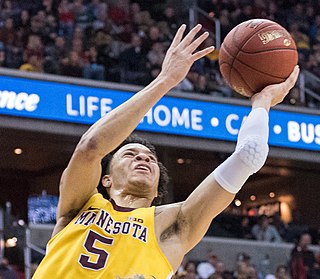
Amir Coffey is an American professional basketball player for the Los Angeles Clippers of the National Basketball Association (NBA). He played college basketball for the Minnesota Golden Gophers.

Landry Michael Shamet is an American professional basketball player for the Washington Wizards of the National Basketball Association (NBA). He played college basketball for the Wichita State Shockers and was selected 26th overall by the Philadelphia 76ers in the 2018 NBA draft. He has also played for the Los Angeles Clippers, Brooklyn Nets, and Phoenix Suns.










